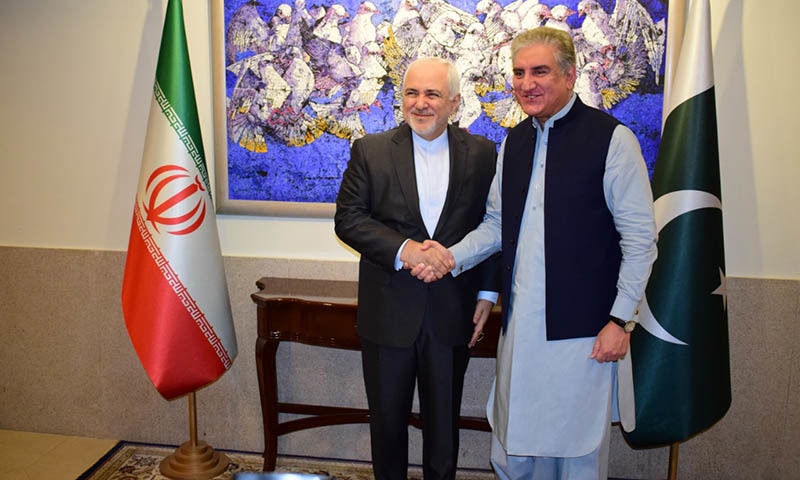As India stops purchase of Iranian oil, Iran offers to link Chabahar with Gwadar
By Aditi BhaduriIranian Foreign Minister Mohammad Javad Zarif proposes connecting Pakistan’s Gwadar port to its “complementary” port Chabahar in southeastern Iran, during his visit to Islamabad
Photo: Dawn/Naveed Siddiqui

Iran’s Press TV quoted Iranian Foreign Minister Mohammad Javad Zarif as saying “We believe that Chabahar and Gwadar can complement each other,” on his arrival in the Pakistani capital of Islamabad on Thursday. “We can connect Chabahar and Gwadar, and then through that, connect Gwadar to our entire railroad system, from Iran to the North Corridor, through Turkmenistan and Kazakhstan, and also through Azerbaijan, Russia, and through Turkey.”
Pakistan’s arch-rival India is trying to develop the port of Chabahar as a way to gain access to the markets of Central Asia as well as Afghanistan by bypassing Pakistan. The port is about 72 km from its Pakistani counterpart Gwadar, which is being developed by China.
In May 2016, India, Iran, and Afghanistan signed an agreement on the establishment of a Transit and Transport Corridor among the three countries using Chabahar port as the regional hub for sea transportation. Located on the confluence of the Indian Ocean and the Sea of Oman in southeastern Iran, Chabahar is India’s first foreign port project. For India, especially, this allows access to the markets of Central Asia, including landlocked Afghanistan, while bypassing Pakistan. It would to the same effect enable Afghan merchants to export their commodities – mainly fruits and vegetables as well as nuts and minerals – to global markets through Chabahar. The first shipment of cargo from Afghanistan via Chabahar reached India in March this year., while the first shipment via Chabahar from India reached Kabul earlier this month.
Considering the strategic importance of the Iranian port for Kabul, the US government was forced in November to approve a sanctions exemption for Chabahar in a bid to economically stabilize Afghanistan.
On December 3, 2017, Iranian President Hassan Rouhani officially launched the first phase of Shahid Beheshti International Port in Chabahar. The annual cargo tonnage of Shahid Beheshti Port – Iran’s only oceanic port – has now almost tripled to reach as high as 8.5 million tons. It can also accommodate 100,000-ton ships – what officials say can help promote the country’s international trade activities.
On the eve of his departure to Pakistan, Zarif told the IRNA news agency that development of Chabahar free trade zone is high on the agenda of the Iranian Foreign Ministry and foreign policy, noting that Chabahar can help to the development of the region and neighboring countries, including Pakistan and Afghanistan, Zarif said.
India views Chabahar as central to its connectivity objectives with Central Asia and further with Europe via Russia. It also views Chabahar as a hedge against Chinese developed Gwadar port in Pakistan. Zarif’s proposal is sure to raise hackles in New Delhi.
Zarif had paid an official visit to New Delhi on 13-14 May to drum up support for Iran’s position regarding the escalating tensions with the US and its Gulf allies – Saudi Arabia and the United Arab Emirates, and to dissuade New Delhi from ceasing to import Iranian oil. India is Iran’s second largest crude importer, and had availed of a sanctions’ waiver from the US, along with eight other countries, after the US walked out of the Joint Comprehensive Plan of Action (JCPOA) or more popularly called Iran deal, and reimposed sanctions on Iran.. In April the US announced that it was not going to grant anymore sanctions waivers to countries like India, in order to pressure the Iranian regime to give up its nuclear and ballistic missiles program.
Trade between India and Iran had increased by almost $4 bln over the last one year, according to Iranian news agency IRNA. In recent times India has diversified its energy procurement, sourcing them from countries like Nigeria and Venezuela, in a bid to decrease dependence on volatile West Asia.
With the ongoing Parliamentary elections in India, Zarif returned empty-handed to Teheran, after being told that any decision will have to be made by the new government in Delhi.
Yesterday, May, 24, the Press Trust of India reported that Indian Ambassador to the US Harsh Vardhan Shringla has said that India has stopped importing oil from Iran after the United States refused to extend exemption from sanctions earlier this month.
Zarif’s proposal to Pakistan to connect Gwadar with Chabahar can be said to be diplomatic messaging to India who earlier this year had entered into an armed skirmish with its nuclear-armed neighbor. It may also not go down well with Afghanistan, which blames Islamabad for supporting the ongoing Taliban insurgency there.
Meanwhile, Pakistan Foreign Ministry spokesman Dr. Mohammad Faisal at his weekly media briefing in Islamabad on Thursday said that Pakistan supports settlement of all issues through dialogue and called on all states to implement the JCPOA.
Pakistan, however, may not be in a position to do much beyond calling for a dialogue, given its enormous financial dependence on Iran’s arch-rivals Saudi Arabia and the UAE.